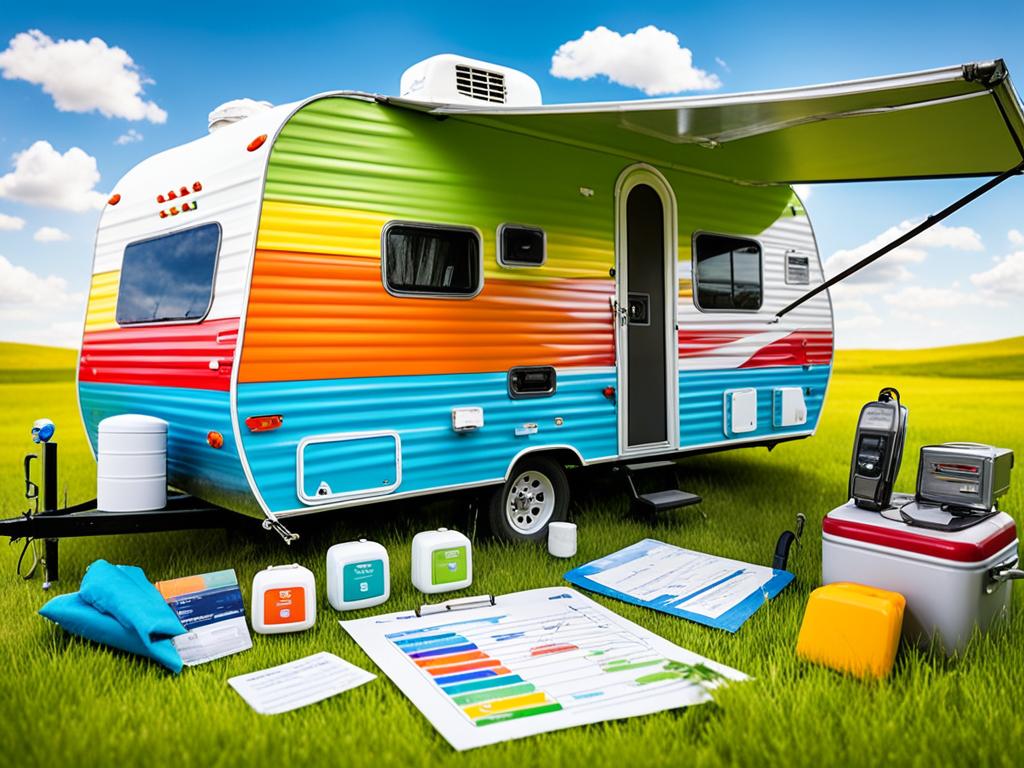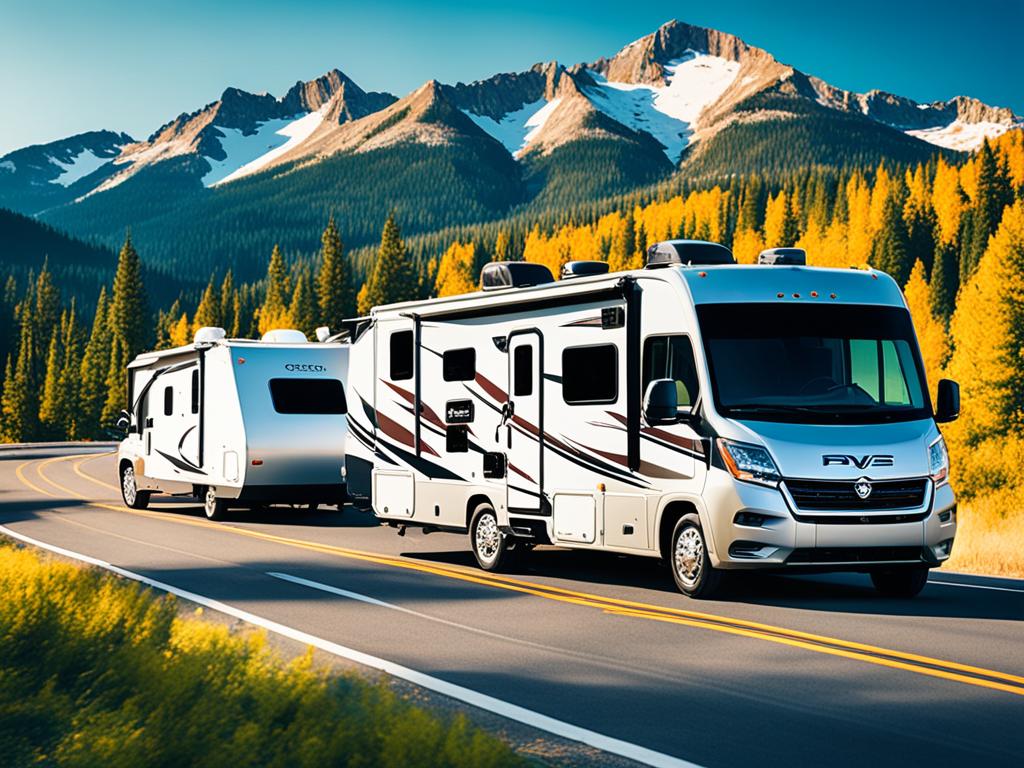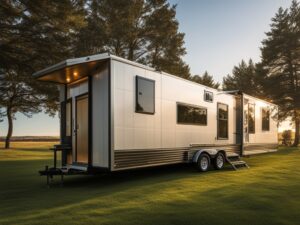Are you an RV enthusiast looking to explore the country? A travel trailer is a great way to bring home comforts on the road. But, before you start, make sure your trailer is insured. This guide will cover the main factors that affect travel trailer insurance costs, the coverage options, and what you might pay for your RV.
Whether you’re new to RVing or a pro, knowing how much to insure your travel trailer is key. This guide will help you understand RV insurance costs. You’ll learn how to choose the right coverage and plan your budget.
What Factors Influence Travel Trailer Insurance Costs?
Insuring your travel trailer involves several factors that affect the cost. Knowing these can help you choose the best policy for your needs.
Your Level of Coverage
The cost of your travel trailer coverage depends on the protection you pick. Liability is the cheapest option. Adding comprehensive, collision, and other coverages raises the cost. The more coverage, the higher the recreational vehicle insurance costs.
The Value of Your RV
The cost to insure your travel trailer also depends on its value. More expensive RVs cost more to insure. A luxury towable trailer will be pricier than a basic one when insuring a travel trailer.
Full-Time vs. Part-Time Usage
How often you use your travel trailer affects the insurance cost. Full-time RV insurance is pricier due to higher accident risks from frequent use.
Location
Where you store your travel trailer also matters. Rates go up if it’s in a high-risk area. A secure storage facility can lower costs.

Understanding these factors helps you estimate the right insurance cost. This way, you can find a policy that fits your needs and budget.
Types of RV Insurance Coverage
Insuring your travel trailer or any RV means looking at several coverage options. From basic to comprehensive and collision, each policy offers different levels of protection. It’s key to understand these options to find the right mix of coverage and cost for you.
Liability Coverage
Liability coverage is the most basic and affordable choice for RV owners. It protects you if you cause an accident, covering damages to others’ property or their medical bills. This coverage is a must-have in most states for anyone driving a vehicle.
Comprehensive and Collision Coverage
Comprehensive and collision coverages protect your travel trailer from damage. Comprehensive covers non-collision damages like theft, vandalism, or natural disasters. Collision covers repairs if you’re in an accident, no matter who is to blame. These coverages are often sold together and may be needed if your trailer is financed.
Additional Coverage Options
- Medical payments coverage to help with medical expenses for you and your passengers
- Roadside assistance to provide help if you experience mechanical issues or a flat tire
- Contents coverage to protect the personal belongings stored inside your RV
- Vacation liability to cover damages or injuries that occur while you’re camping or parked
Adding more coverage to your RV insurance means higher rv insurance rates and camper insurance costs. But, it’s crucial to think about the extra protection versus the possible costs of an accident or incident.

Average RV Insurance Costs by Type
Insuring a travel trailer or other RVs can cost a lot. On average, it’s around $200 to $600 a year. But, if you have a self-propelled Class A motorhome, it could be $600 to $2,500 a year.
The cost of travel trailer insurance depends on many things. This includes the RV’s value, the coverage you pick, and your driving history. The RV’s age, condition, and how you use it also play a part in the cost.
| RV Type | Average Annual Insurance Cost |
|---|---|
| Travel Trailer | $200 – $600 |
| Class A Motorhome | $600 – $2,500 |
To get a better idea of what you’ll pay for travel trailer insurance, get quotes from different insurers. This way, you can find the best coverage for your budget.
How Much to Insure Travel Trailer
Insuring your travel trailer can cost a lot, but it varies. You might pay between $250 and $500 a year for basic coverage. The price changes based on several things, like how much coverage you want, your RV’s value, and how you use it.
Let’s dive into what affects the cost of insuring your travel trailer:
- Coverage Limits: Choosing higher coverage limits means paying more. More liability, comprehensive, and collision coverage will raise your yearly premium.
- RV Value: A pricier travel trailer costs more to insure. New, high-end models usually have higher insurance costs than older, cheaper ones.
- Usage: Full-time living in your travel trailer means paying more for insurance. It costs less if you use it just for trips and vacations.
- Location: Where you live can change your insurance costs. Rates might go up in places with a lot of theft, natural disasters, or other dangers.
Knowing these factors helps you guess the cost of insuring your travel trailer. It also lets you plan your budget. Remember, comparing quotes from different insurers can help you find the best deal for your needs.
Towable RVs vs. Motorhomes
The type of RV you own affects your insurance costs. Towable RVs like travel trailers and pop-up campers are cheaper to insure than motorhomes. This is because they have fewer parts and are simpler to build.
Towable RVs
Towable RVs are more affordable because they don’t have as many parts as motorhomes. They don’t need their own liability insurance since they’re towed by another vehicle. You can usually add them to your car insurance, which can save you money on travel trailer insurance cost or trailer insurance quotes.
Motorhomes
Motorhomes, being self-moving, cost more to insure. The bigger and more luxurious they are, the higher the insurance costs. For example, big Class A motorhomes can cost between $600 to $2,500 a year for insurance. Smaller Class B and Class C motorhomes might cost between $480 to $1,500 annually for rv insurance rates.
When thinking about insuring a camper trailer or a motorhome, consider the pros and cons. Knowing how each type affects your insurance costs can help you make a smart choice. This way, you can get the right coverage without spending too much.
Cost-Saving Tips for RV Insurance
Insuring your travel trailer or RV can be expensive. But, there are ways to cut costs. By making smart choices, you can save money on your RV insurance without losing coverage.
Increase Your Deductible
Increasing your deductible can lower your travel trailer insurance costs. A higher deductible means lower monthly or annual payments. Just make sure you can afford the deductible if you need to make a claim.
Bundle Policies
Some insurance companies offer discounts when you bundle your towable trailer insurance with other policies. This includes auto, home, or life insurance. These discounts can help you save on your camper insurance costs.
Take an RV Safety Course
Finishing an approved RV safety course can get you discounts from some insurers. Showing you know how to safely operate your RV makes you a lower risk. This could lead to savings on your insuring a travel trailer policy.
Using these tips, you can enjoy your travel trailer or RV without spending too much on recreational vehicle insurance. With some research and planning, you can find the right balance of coverage and cost for your needs.
Factors Affecting RV Insurance Premiums
Insuring your travel trailer involves several factors that affect the cost. Just like car insurance, your driving history is key. If you have a clean record with no accidents or violations, you’ll likely pay less for rv insurance rates.
How you use your travel trailer also matters. If you’re on the road for weekends or live in it full-time, it changes your insurance costs. Full-time RV living usually means paying more for travel trailer insurance than just using it for fun.
Where you keep and use your travel trailer can also change your insurance price. Rates might go up in places with more crime or natural disasters that could harm your RV. Trailer insurance quotes can be higher in risky areas than in safer ones.
Your Driving Record
- Clean driving history leads to lower rv insurance rates
- Accidents and violations can increase full-time rv insurance costs
RV Usage
- Part-time recreational use typically costs less than full-time rving insurance
- Full-time RV residents pay higher travel trailer insurance cost
Your Location
The area where you keep and use your travel trailer affects your how much to insure travel trailer insurance costs:
- Higher rates in high-crime areas
- Increased costs in regions prone to natural disasters
Conclusion
Getting the right insurance for your travel trailer is key for peace of mind and protecting your investment. Knowing what affects RV insurance costs, like coverage level, vehicle value, and how you use it, helps you pick the best policy. This way, you can find a policy that fits your needs and budget.
Whether you’re living in an RV full-time or just taking weekend trips, having comprehensive insurance is a must. Look into different RV insurance types, like liability, comprehensive, and collision, to get the right protection. A bit of research and planning can help you get the best value for your money when insuring your travel trailer.
When looking at RV insurance, consider ways to save money. Increasing your deductible, bundling policies, and taking an RV safety course can help. These steps can balance coverage with cost, letting you enjoy making memories on the road. Let insurance experts help you find the perfect policy for your travel trailer adventures.
FAQ
How much does it cost to insure a travel trailer?
What factors influence the cost of travel trailer insurance?
What types of RV insurance coverage are available for travel trailers?
How do the insurance costs compare between towable RVs and motorhomes?
How can I save money on my travel trailer insurance?
What other factors affect RV insurance premiums?
FAQ
How much does it cost to insure a travel trailer?
Insuring a travel trailer or other towable RV costs about 0 to 0 a year. The price changes based on the RV’s value, your coverage, and your driving history.
What factors influence the cost of travel trailer insurance?
The cost of insuring a travel trailer depends on several things. These include your coverage level, the RV’s value, and how often you use it. Where you store and use your trailer also matters.
What types of RV insurance coverage are available for travel trailers?
You can get different types of RV insurance for travel trailers. These include liability, comprehensive, collision, medical payments, roadside assistance, and contents coverage. The more coverage you pick, the more you’ll pay.
How do the insurance costs compare between towable RVs and motorhomes?
Towable RVs like travel trailers are cheaper to insure than motorized RVs. Self-propelled motorhomes, especially big Class A models, can cost 0 to ,500 a year to insure. Towable RVs usually cost between 0 and 0.
How can I save money on my travel trailer insurance?
You can lower your travel trailer insurance costs in a few ways. Raise your deductible, bundle your policy with other insurance, take an RV safety course, and keep a clean driving record.
What other factors affect RV insurance premiums?
Your driving history, how you use your travel trailer, and where you keep and use it can change your insurance rates.
FAQ
How much does it cost to insure a travel trailer?
Insuring a travel trailer or other towable RV costs about 0 to 0 a year. The price changes based on the RV’s value, your coverage, and your driving history.
What factors influence the cost of travel trailer insurance?
The cost of insuring a travel trailer depends on several things. These include your coverage level, the RV’s value, and how often you use it. Where you store and use your trailer also matters.
What types of RV insurance coverage are available for travel trailers?
You can get different types of RV insurance for travel trailers. These include liability, comprehensive, collision, medical payments, roadside assistance, and contents coverage. The more coverage you pick, the more you’ll pay.
How do the insurance costs compare between towable RVs and motorhomes?
Towable RVs like travel trailers are cheaper to insure than motorized RVs. Self-propelled motorhomes, especially big Class A models, can cost 0 to ,500 a year to insure. Towable RVs usually cost between 0 and 0.
How can I save money on my travel trailer insurance?
You can lower your travel trailer insurance costs in a few ways. Raise your deductible, bundle your policy with other insurance, take an RV safety course, and keep a clean driving record.
What other factors affect RV insurance premiums?
Your driving history, how you use your travel trailer, and where you keep and use it can change your insurance rates.




